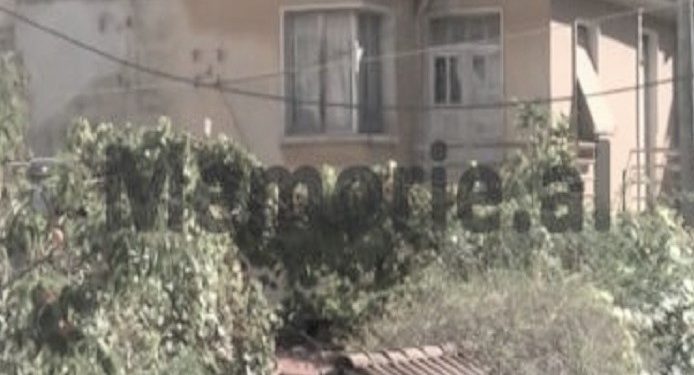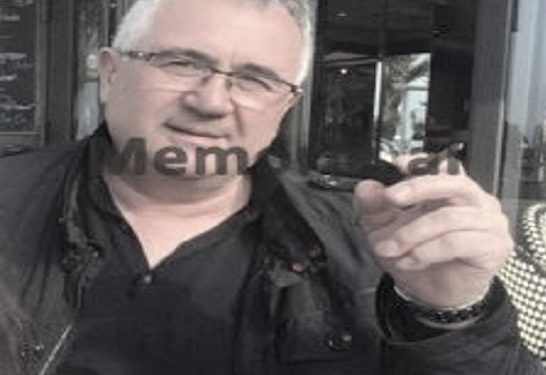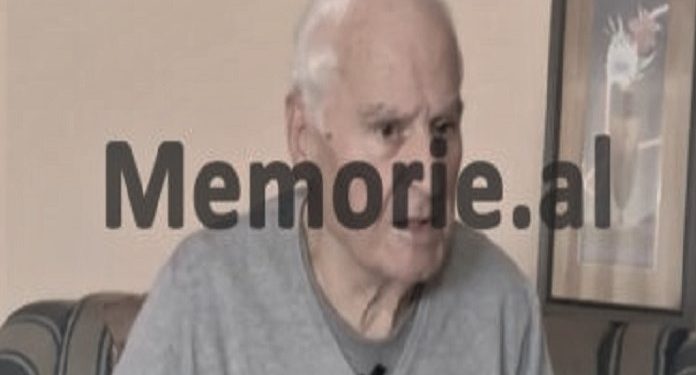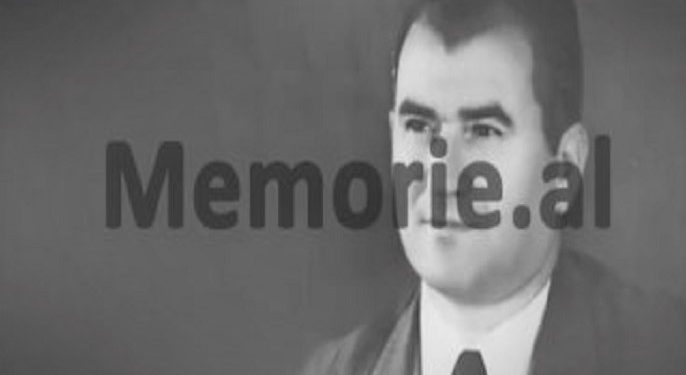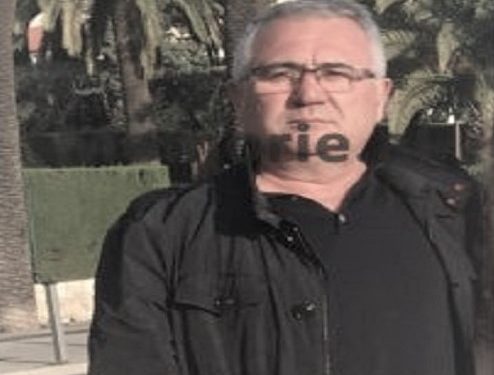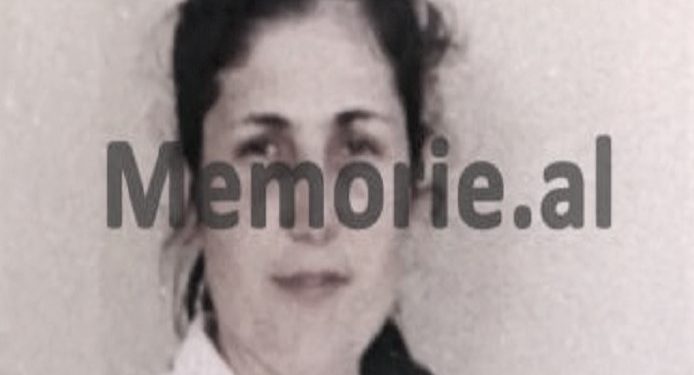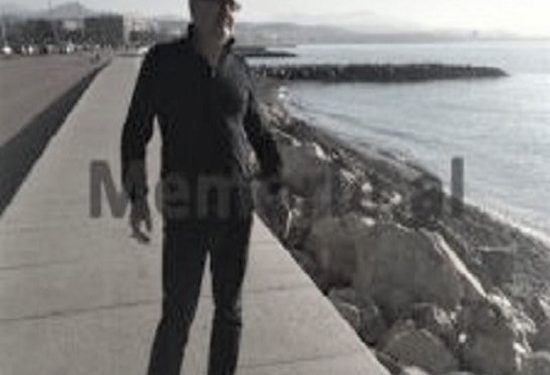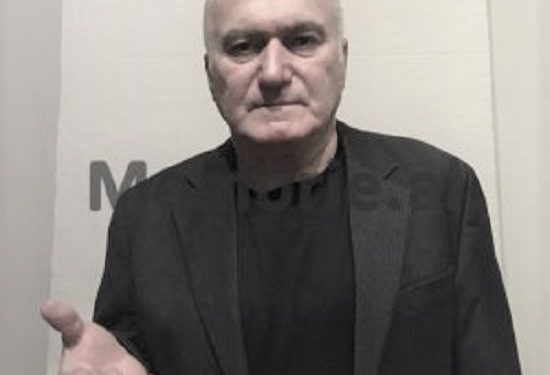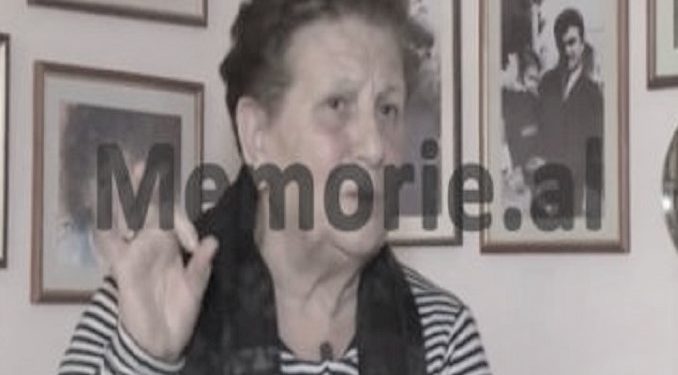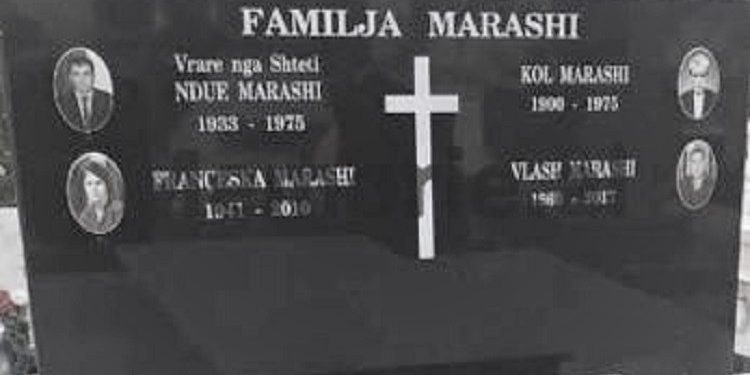Dashnor Kaloçi
The fifth part
Memorie.al publishes the unknown story of Ndue Marashi, former Chairman of the Executive Committee of Tirana, member of the People’s Assembly and member of the Central Committee of the ALP, who on December 16, 1975, was found dead by a pistol bullet in one of the rooms of his villa (at the “Red School”), the circumstances of which have not been clarified even today after 45 years?!
Rare testimony of his son, 62-year-old Xhovalin Marashi who has lived in Belgium for years, who testifies for the first time publicly, the whole unknown story of his father and the Marashi family, starting from: their origin, arrival in Tirana, work, education, graduation and career of Ndue first in Kamza and then in the Kashar cooperative, the Party Committee of the Region no. 4 and then as Chairman of the Executive Committee of Tirana, where he served from 1973 until December 16, 1975, when Xhovalini and his younger brother, Vlash, found their bloodied father in the last minutes of life and the bus that we announced by phone, came after only 45 minutes ?!
Xhovalini’s story about the friendships that their father had with a part of the senior leadership such as: Beqir Balluku, Abdyl Këllezi, Fadil Paçrami and Myslym Peza, or others with lower positions and functions such as: Irakli Bozo, Abedin Çiçi, Mark Dodani, Hazbi Lamçe, Demlush Thaçi, Fadil Lamin, Halim Stërmasi, Ilir Gjylbegu, Panajot Pano, Fatmir Frashëri, Bert Jashari, Miti Dheodhosi etc.
How was the execution scheme of Ndue Marashi carried out, who were the people who attacked him in the Politburo and those whom the State Security committed to his physical elimination and why his son, Xovalini, rules out that it was done with the knowledge of Enver Hoxha, who is said to be one of the people who loved Ndue very much and he together with Nexhmija and their son, Iliri, have done a lot for the Marashi family, starting from… ?!
After the publication of some articles by Memorie.al in the last two issues, regarding the story of the former Chairman of the Executive Committee of Tirana, member of the Central Committee of the ALP and member of the People’s Assembly, Ndue Marashi, who for 45 years Earlier, at noon on December 16, 1975, he was found dead in one of the rooms of his villa, which is still located somewhere near the “Red School”, where according to the official version, given by the press release that was published the next day in the press, he had committed suicide, Memorie.al returns to this story.
After the publication of some articles by Memorie.al in the last two issues, regarding the story of the former Chairman of the Executive Committee of Tirana, member of the Central Committee of the ALP and member of the People’s Assembly, Ndue Marashi, who for 45 years Earlier, at noon on December 16, 1975, he was found dead in one of the rooms of his villa, which is still located somewhere near the “Red School”, where according to the official version, given by the press release that was published the next day in the press, he had committed suicide, Memorie.al returns to this story.
This serious event, which did not go unnoticed even at the time it happened, as we refer to the official version, was the first time after many years that a suicide took place by a senior state official, (we have in mind, in in 1947 Nako Spiron, former Chairman of the State Planning Commission, who ‘de jure’, was the Prime Minister of the country and then in 1956, Omer Nishani, the President of Albania, or as he was called at the time, the Chairman of the Presidium of People’s Assembly), and according to communist morality, as well as the laws in force, suicide was considered a hostile act and the person who did so, especially when in office, was at best considered a “defeatist and capitulator”, otherwise was labeled as: “traitor and enemy of the people”!
Based on these, Ndue Marashi was not an exception from the communist regime of that time and all the accusations against him as “enemy of the people” etc. fell on him, and his family was expelled from Tirana and persecuted until the collapse of communist regime. Regarding this event and the mysteries, it still carries, it was written only after the ’90s and in 2018, a television documentary was made by the Albanian Public Radio-Television, where family members of Ndue Marashi, gave their related versions with that event.
Given the fact that on December 16, it was 45 years since the day Ndue Marashi lost his life in tragic circumstances and that event still remains shrouded in mystery, Memorie.al was contacted by Mr. Xhovalin Marashi, (Ndue Marashi’s eldest son), has been living with his family in Belgium for years, who after thanking our editorial staff for the articles published about his father, was also willing to give a long interview and exclusive to Memorie.al, making public for the first time, many of the unknown sides of that story related to the name of Ndue Marashi and their family, an interview which we are publishing starting from this issue.
Followed by the last number
Mr. Xhovali, without wanting to question your testimonies, but how do you explain the help or tolerance we are saying, what Nexhmije Hoxha did to your family (that is, what he sent to Tapiza and not to the villages of Lushnja where they were assigned), when many cases are known with concrete facts, that Nexhmija has “sunk” worse those who asked for help?!
I do not want to question what you say as a journalist about Nexhmije Hoxha, but what I said, that she received our mother, Franceska and uncle Zefi in a meeting and saved us from exile, sending us to Tapiza and there not as exiles, but as deportees, is a fact already known. This can be confirmed by our uncle, Zefi, who still lives in Tirana, as well as the family of Nexhmije Hoxha, Iliri and Teuta, who also remember the friendship they had with our family, and how much he loved her. Enver Hoxha, our father, Ndue Marashi, whom he did not call by name, but said: “Where are you loyal to the Party”. Not only that, but as we later learned, the physical elimination of our father, ie his murder, was originally intended to be published as an “accidental murder”!
Like accidental murder…?!
They would present him, saying: “he fired his weapon, cleaning it”, as they did with other people, which that regime physically eliminated. (You personally as a journalist know very well, but this is already known by everyone that it has been made public, how Mehmet Shehu wrote in the letter he left after his death which he sent to Enver Hoxha, saying: “Manipulate, you say that the gun exploded in his hands… ”), But those plans, that is, that“ Ndue Marashi accidentally fired the gun… ”, were“ burned ”by our mother, Franceska, who, as soon as she found out about her father’s murder, accused him of being a murderer and this there was one more reason, that he and I were not allowed to enter the house where my father’s dead body was, at a time when they left my brother, Vlash, three years younger! In addition to what I told you, so that uncle Zef Marashi and the Hoxha family can testify very well, Besnik Nallbani, the former secretary of the People’s Council of our neighborhood, (who we as a family can also testify to this very well) we had a lot of friends), but unfortunately he passed away in Tirana two days ago, from Covid 19, and if you allow me, I find the opportunity through this interview to express my condolences to the Nallbani family, who are with us in the most difficult times.
Before the decision was made for you as a family to go to Tapiza, in those days, what was happening in your house, did anyone come to comfort you, from the relatives, or friends and acquaintances that your father had?
Those words of my mother, seem to have convinced them and thus an event was eliminated that would have extremely serious consequences, not only for those noble and brave people, but also for our family. But to be exact to the end, I want to clarify that our mother, Francesca, is not that she did those actions out of bravery or spiritual shock, that is, when she accused those of the Ministry of Internal Affairs of being “murderers”. of her father, or when she told our mountain friends from Dukagjini, that “this job will be solved”, etc., but she believed that we, the father, Ndue Marashi and our whole family, were loyal to the Party and what had happened to us, i.e. the murder of the father, was the work of the enemies of the Party. Even as I told them from the beginning of this interview, my mother had this thought until she closed her eyes. Not only my mother, but also us as a family, are again of this opinion, as there was no reason for Enver Hoxha to eliminate or approve the murder of our father, when they had helped us and offered us family friendship. Our father was physically eliminated by the clan of Manush Mufti, Mehmet Shehu and Kadri Hazbi (through their “mass”, Nustret Dautaj) and they presented it to Enver, as: “Ndue Marashi was the enemy of the people”. etc., which came after the clash that the father had with them in the Plenum that took place sometime before that event, where the father refused to change the figures than kv. wheat and how many kv. corn per hectare was taken by the agricultural cooperatives of the Tirana district, where they lied to the Plenum and Enver Hoxha for their own purposes (out of fear, etc.).
What about people with party and state functions, did they come to you for comfort in the days after the funeral?
Absolutely no one came to us for comfort, as it was clear what the situation was like, when the people of the party and the government of that time, with whom the father had worked for years, did not even come to our funeral.
How many days did they leave you to be sent to Tapiza?
Before I tell you about our departure from home to Tapiza, which took days, that is, less than ten days, the hardships of life and our discrimination, such as: “the children of the enemy of the people”, began in those days, when I was asked to go to school only after two days (ie December 19, 1975), making it clear to me that otherwise I would be expelled from school. So, my brother Luli and I went to school, leaving my mother alone at home. I do not forget that I was alive, that while I was sitting in my place, (but now alone), the teacher came and in a commanding tone, told me not to sit by the window, but to find another place from the beginning of the benches, as if they had fear that I would jump out of the third floor window where we had the class, and then they would say: “Here… these as a family, have it in their genes that commit suicide”!
How did the school leaders treat you?
On the third day, while after the big break the whole school was lined up in the yard ready to enter the classrooms, came the school principal (Melo Dodbiba, the wife of the Minister of Agriculture, Pirro Dodbiba), who in the presence of all to the students and teachers who were there, he said to me: “You larg, leave the school, because you will be interned, you are enemies of the people”.
Did you react?
I did not say a word and what she said fell on me like a bomb, as I never expected such a thing. But my luck, that at that time another teacher came, Bashkim Shijaku, (a friend of our family), who approached me and said: “Leave, do not worry” and after I look at the school principal with anger, he hugged me with much longing. This surprised all the students of the school who were lined up there, who looked at me with great regret and were ready to hug me all, just like the Union teacher. After that, a childhood friend of mine, Engjëllë Lamçe, (son of the former director of the Albanian Telegraphic Agency at the time), came and escorted me to the door. I will never forget the man who unfortunately is no longer alive, but also, I cannot forget the director Melo Dodbiba, who only after three or four months, in April 1975, suffered the same fate as and us! Even worse, after they were interned in the village of Llakatund in Vlora, where her husband, Pirro Dodbiba, who until then had been Minister of Agriculture, Member of the People’s Assembly, candidate of the Politburo of the Central Committee of the ALP, etc., worked as a simple accountant for the agricultural cooperative of that village, where there were many other internees.
Going back to your trip to Tapiza, how do you remember it?
I remember that on December 26, we were living in Tapiza, where they prepared an apartment for us quickly and next to us, they brought our uncle, Zef Marashi with the whole family, as they had previously expelled him from the Party and removed him from work. Three days after we went there, on December 29, my uncle Zefi and I started working in agriculture, opening canals. No one forced me to go to work, as I could go to school, but the urgent family need, as we went to Tapiza with no money to buy dry bread. The last money we had was the one that my mother sold the two pairs of shoes to pay for my father’s funeral and no other money. So, this was all our wealth as the family of the former chairman of the Executive Committee of Tirana, member of the Central Committee of the ALP and member of the People’s Assembly, a blind loyalist of the Party and Enver Hoxha, who since the age of 15-year-old had received the card of the ALP, (like no one else in the history of that Party), who all his life worked honestly.
Can you describe to us how you initially faced that difficult situation, not only economically, because as you said, you were without any income, but also spiritually? After the comforts given to them by the status of father, as the man who ruled Tirana, MP, and other functions and duties (with villa, car available, people who served them, etc.), now a family in a village on the outskirts of district of Tirana, without any income, working in agriculture, to make a living…?!
For the sake of truth, I am telling you that it has been a horror that I cannot find words to describe. The first days when we had no money at home, our aunt, Teresa, came and brought us some money to postpone for a few days. A discrimination in the full sense of the word, in the way we were treated. The heaviest of us was my mother, Francesca, only 34 years old, while I was 17, and my brother Luli, under 15 years old. Indescribable discrimination, as they gave us only half of the salary, because they kept the rest for us to pay the amount of 42,000 all (old) for the repair of the villa that Katina Starja had made, whose bill, as I told them, brought it to us, as she had complained, saying that Ndue Marashi, had changed the original colors that the villas had. Given all this, that is, the unprecedented psychological terror, as well as the difficult mental state that was aggravated by the economic situation, our mother, Francesca, went into a state of depression and attempted suicide, taking a handful of drugs at once. But fate saved her and she was mentioned after three days in a coma, without the help of a doctor, because we could not call her, as we knew that no one approached us.
Given the situation you were in, did your mom complain with letters as was the case at the time, so did not write to any of the top leadership?
The mother did not write to anyone, because only after a few months, Manush Myftiu came to Tapiza and with some of those who accompanied him, he went directly to where our mother, Franceska was working, and addressed her, saying: “Hey my Ak reactionary, are you okay there”? And after his mother did not answer him at all, but only saw him with anger and contempt, he continued: “There you will die, you with your cub…”! My mother certainly did not react again, but she told us at home at dinner, that she was ready to shoot him with a shovel, but she also had no power, and she had our grief, where would she leave us two boys, after they imprisoned him?! After the situation we were in, my mother became seriously ill and was not operated on, as no doctor dared to take over. After that, at the house of our aunt, Marta, where the sick mother was staying, a friend of our house, Doctor Ali Kastrati, came to us and told our uncle: “Francesca needs urgent surgery, because she has a tumor”. Then, with the intervention of our aunt, Dila, to Doctor Ilir Gjylbegu (with whom she had worked for years in the sanatorium as head nurse), her mother was operated on and she left the hospital only a month later. He was already weak and weighed a little over 30 kg. / Memorie.al
Continues tomorrow





